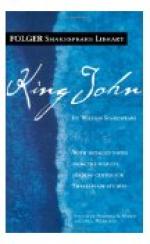|
This section contains 9,311 words (approx. 32 pages at 300 words per page) |

|
Steve Longstaffe, S. Martin's College Lancaster
Deborah Curren-Aquino, summing up fifty years of critical engagement with Shakespeare's King John, identifies a radical break with earlier views of the play in "the tendency in post 1940 scholarship to describe John as ambivalent, ambiguous, suspicious, sceptical, questioning and ideologically subversive".1 The form and tone of John, in other words, are recognisably modern. Few critics have gone as far as Sigurd Burckhardt, who in the 1960s asserted that the play documented Shakespeare's own modernity, defined as the recognition that order, or "justice and truth at the heart of things", was of human, rather than divine, origin.2 Burckhardt's position, though not his confidence that he could show that "when he wrote King John, or quite possibly in writing it, Shakespeare became a 'modern'", is echoed in Virginia Vaughan's claim of 1989 that the play "like Shakespeare's other history plays" depicts a crucial point in...
|
This section contains 9,311 words (approx. 32 pages at 300 words per page) |

|


